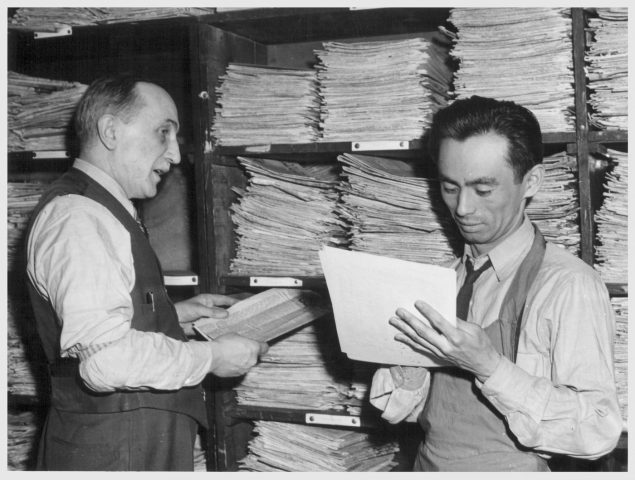
Joe Oyama in an Online California Archives photo, as he stands in the New York headquarters of the Common Council for American Unity. Joe was assistant editor of the Japanese American daily in Los Angeles before he was interned, in Santa Anita Assembly Center and Jerome Relocation Center, where both he and his wife Sami worked as journalists. After moving to New York in 1944, he was editor of the News Letter of the Japanese American Committee for Democracy. He and his wife were also both actors. They moved to Berkeley in their later years. I got to know him and Sami and their two children, who are also great artists. Joe was always supportive of my poetry: “Like champagne,” he said once. This poem is for Joe and all the other great journalists. May the legacy live on.
A Poem for Journalism
By Yuri Kageyama
A Tree, a Story, a Drum
Circles carved times over,
Coded rhythms of continents
Animal skin stretched, carefully nailed,
So our heartbeat is not lost _
The snare, congas, kpanlogo, tabla, taiko,
Talking drums speaking faraway tongues _
Stories killed, stories buried,
Stories denied, stories untold,
Perhaps we were just not stopped before
When our stories were not dangerous
But the Reporter is still here.
Hear the words
And see what they have seen:
Robert and Dori Maynard
Woodward and Bernstein
Margaret Bourke-White
Howard Imazeki
Gary Webb
Robert Capa
Anja Niedringhaus
Gerald Vizenor
Gwen Ifill
Joe Oyama
Gordon Parks
Hear that Music in the Skin,
Feel that Story in the Tree,
Banned by slave owners,
The Drum holds the Message,
The Pow Wow stirs in starlit nights
The Slap-Tone conviction that comes to us
The Dance cannot be silenced; listen:
Printers rumble, digital pages scroll, newspapers turn,
Borders fade into illusory walls,
Starving children, covered up documents, the ravages of war
The Voice through the centuries
Asking Questions
Even if no one cares to hear the Answers,
Accurate, objective, fast, ethical
No matter what they say,
I am deranged but I am not deranged
I am fake but I am not fake
I am afraid but I am not afraid
I am the Drum, the Tree, the Story.